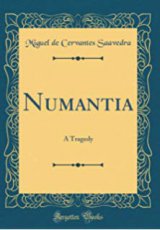The Siege of Numantia Page #9
The Siege of Numantia is a tragedy by Miguel de Cervantes set at the siege of Numantia. The play is divided into four acts. The dialogue is sometimes in tercets and sometimes in redondillas, but for the most part in octaves.
LEONCIO. O Morandro, calm thy breast; Let me see thine ancient glance; For by hidden ways, perchance, Help will reach us--and the best. Sovereign Jove will doubtless show To our brave Numantian folk How to burst this Roman yoke By some sharp and sudden blow. Then in calm and sweet repose Wilt thou seek thy wedded wife, And in love's endearing strife Soon forget thy present woes. For this day, by sage advice, Will Numantia, all astir, Unto Jove, the Thunderer, Make a solemn sacrifice. See what crowds of people hie With the victim and the fire! Mighty Jove, all-powerful sire, Look upon our misery! [There enter two Numantines, clad as ancient priests, leading in between them, fastened by the horns, a big lamb, crowned with olive or ivy and other flowers; also a page with a silver salver and a towel on his shoulder; another with a silver goblet filled with water; another with one filled with wine; another with a silver dish and a little incense; another with fire and wood; another who arranges a table with a coverlet, on which all the aforesaid articles are placed. There enter on the scene all those who have already appeared in the comedy in the dress of Numantines, the priests coming after; and one of them, letting go the lamb, thus says: First Priest. Most certain signs, foreboding woes unchecked, Have shown their evil forms across my way, And my hoar hairs are standing all erect. Second Priest. If my divinings lead me not astray, No good will issue from this enterprise. Alas, Numantia! Ah, luckless day! First Priest. Let us, despite these mournful auguries, Perform our office with becoming speed. Second Priest. Bring hither, friends, this table, and likewise The incense, wine, and water which we need Arrange thereon. Now stand ye all apart; Repent ye of your every evil deed; The first and best oblation on your part Is that which heaven regards with chiefest grace, A chastened spirit and a guileless heart. First Priest. The fire upon the ground ye must not place. There comes a brazier to receive it now, For so our rites demand in such a case. Second Priest. Make clean your hands and necks, and keep your vow. First Priest. Bring water here! Is not the fire alight? One. No man can kindle it, my lords, I trow. Second Priest. O Jove! Will adverse Fate, to our despite, Pursue us thus to ruin in its ire? What keeps the kindle-wood from taking light? One. It seems, my lord, there is some little fire. First Priest. Away with thee, thou lurid flame and spare! The sight of thee makes every hope expire. Mark how the thickening smoke is curling there, And to the western side directs its flight; While that pale flame which quivers in the air Darts to the east its points of yellow light; A luckless sign, which hastens to proclaim That total loss and ruin are in sight. Second Priest. Although our death may give the Romans fame, Their victory, methinks, to smoke will turn, Our death and glory change to vivid flame. First Priest. Since it is fitting, bring the hallowed urn, And quick bedew the sacred fire with wine; The incense also it behoves to burn. [They besprinkle the fire and its adjuncts with wine, and then place incense on the fire. Second Priest. Great Jupiter, direct thy force benign For good to sad Numantia in her woe, And turn to naught the stern opposing sign. First Priest. As burns the sacred incense in the glow, Forced into smoke by virtue of the fire, So exercise thy virtue on the foe, That all his wealth and glory, powerful Sire, May pass away in clouds of murky air, As thou canst do it, and as I desire. Second Priest. May Heaven restrain the foe with arm laid bare, As now we hold this victim firmly bound, And may he share the fate she hath to share! First Priest. Ill bodes the augury; no hope is found That our beleaguered town will e'er be free To burst the tightening bonds that gird her round. [Under the stage they make a noise with a barrel full of stones, and discharge a rocket. Second Priest. Didst thou not hear a noise, my friend, or see That flaming bolt which passed with angry flight, In speedy answer to thy prophecy? First Priest. I stand appalled; I quake with very fright; What fearful signs are hovering in the sky, Foreboding bitter end, disastrous fight! Seest not that troop of eagles fierce on high, Who fight these birds with cruel beak and bill, And round their quivering prey in circles fly! Second Priest. They use alone their strength and cruel will To drive these birds into some narrow spot, Then close them in with wily art and skill. First Priest. That omen I denounce; I like it not: Imperial eagles conquering as they go! Numantia falls,--it is her certain lot. Second Priest. Eagles, the heralds of stupendous woe! Thine augury is true; it fits the case: Our hours are numbered,--it is time to go. First Priest. Not yet; the sacrifice must now take place Of this pure victim, destined to appease The deity who shows the fearful face. O mighty Pluto, thou whom Fate did please To grant a dwelling in the realms obscure, And rule the infernal hosts with thy decrees; As thou wouldst live in peace, and rest secure That she, of sacred Ceres daughter fair, Will greet thy love with an affection pure, Then listen to this wretched people's prayer; Do all that lies within thy proper sphere, And make their welfare thy peculiar care. Seal up that horrid cave profound and drear Whence sally forth the direful Sisters three, To do the damage we have cause to fear, For much they revel in our misery. [He takes some flocks of hair from the lamb and throws them into the air. So may the wind make all their projects vain, And as I now proceed to lave and stain This shining knife with that pure victim's gore, With guileless spirit and a purpose plain, So may Numantia's soil be sprinkled o'er With Roman blood; and may its reddened sands Serve also for their grave, as oft before. [_Here enters from under the stage a demon, from the
Translation
Translate and read this book in other languages:
Select another language:
- - Select -
- 简体中文 (Chinese - Simplified)
- 繁體中文 (Chinese - Traditional)
- Español (Spanish)
- Esperanto (Esperanto)
- 日本語 (Japanese)
- Português (Portuguese)
- Deutsch (German)
- العربية (Arabic)
- Français (French)
- Русский (Russian)
- ಕನ್ನಡ (Kannada)
- 한국어 (Korean)
- עברית (Hebrew)
- Gaeilge (Irish)
- Українська (Ukrainian)
- اردو (Urdu)
- Magyar (Hungarian)
- मानक हिन्दी (Hindi)
- Indonesia (Indonesian)
- Italiano (Italian)
- தமிழ் (Tamil)
- Türkçe (Turkish)
- తెలుగు (Telugu)
- ภาษาไทย (Thai)
- Tiếng Việt (Vietnamese)
- Čeština (Czech)
- Polski (Polish)
- Bahasa Indonesia (Indonesian)
- Românește (Romanian)
- Nederlands (Dutch)
- Ελληνικά (Greek)
- Latinum (Latin)
- Svenska (Swedish)
- Dansk (Danish)
- Suomi (Finnish)
- فارسی (Persian)
- ייִדיש (Yiddish)
- հայերեն (Armenian)
- Norsk (Norwegian)
- English (English)
Citation
Use the citation below to add this book to your bibliography:
Style:MLAChicagoAPA
"The Siege of Numantia Books." Literature.com. STANDS4 LLC, 2024. Web. 24 Nov. 2024. <https://www.literature.com/book/the_siege_of_numantia_60>.




Discuss this The Siege of Numantia book with the community:
Report Comment
We're doing our best to make sure our content is useful, accurate and safe.
If by any chance you spot an inappropriate comment while navigating through our website please use this form to let us know, and we'll take care of it shortly.
Attachment
You need to be logged in to favorite.
Log In